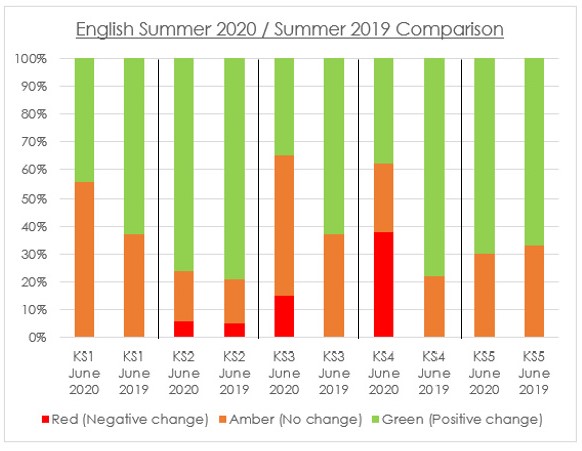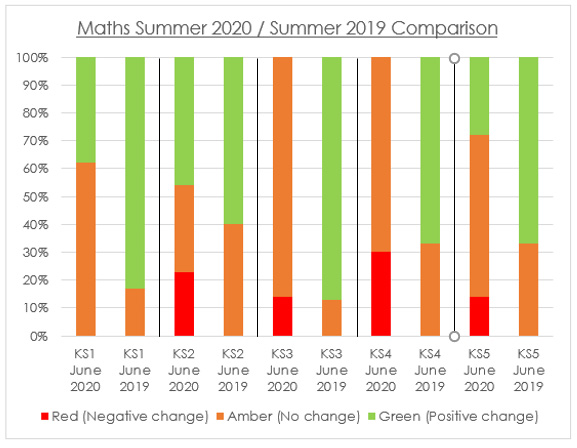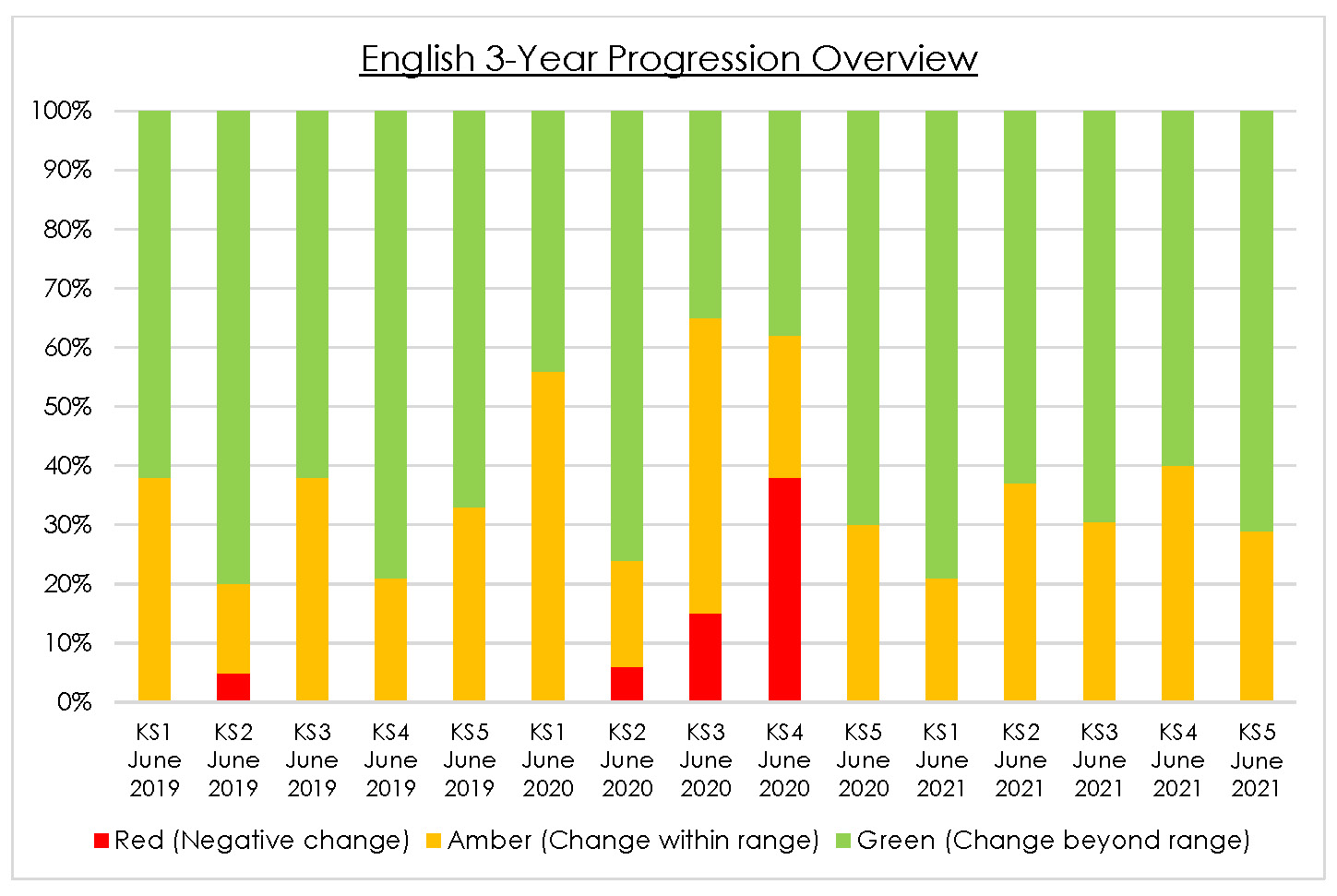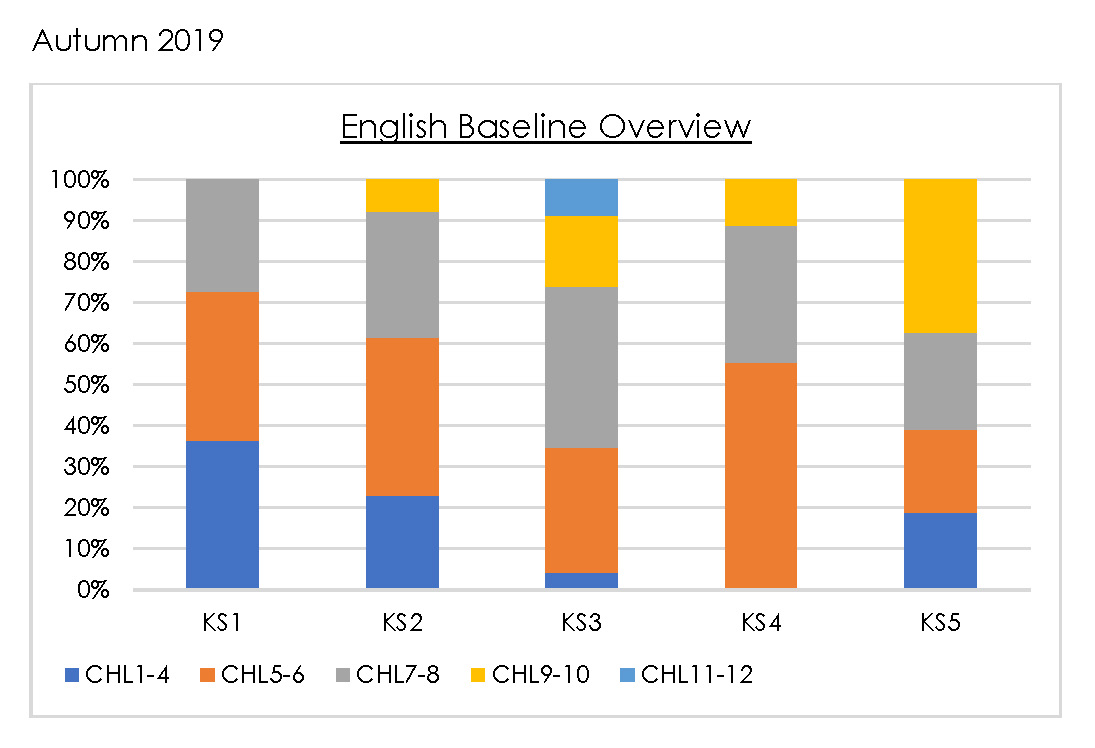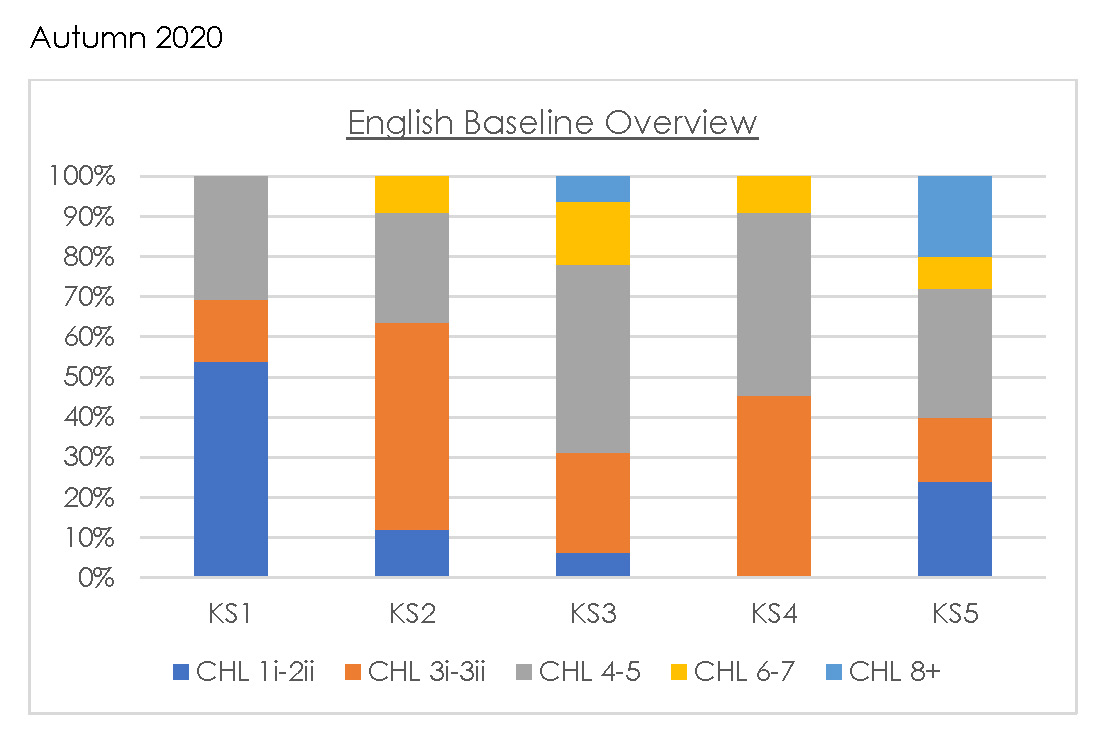This literacy and numeracy catch-up premium gave schools additional funding to support year 7 pupils who did not achieve the expected standard in reading or maths at the end of key stage 2.
It was discontinued at the end of the 2019-2020 academic year.
Each yearly report includes:
- how much year 7 catch-up premium funding was received for that academic/financial year
- details of how the funding was spent
- details of how the year 7 catch-up premium was spent in the previous academic/financial year
- how it made a difference to the attainment of the pupils who attract the funding and how the effect it had was assessed
Year 7 Catch-Up Premium
The Covid-19 Pandemic had an impact on pupil progress, most notably in the summer term 19-20, during which fewer pupils achieved their end of year targets compared to 18-19 and 20-21 (see image 1).
Discussions with teachers and the SLT in Pupil Progress Interviews highlighted common issues were to blame for lack of achievement during summer 19-20:
- parental capacity to deliver home-learning activities
- pupil-specific issues, such as health or attendance
- ability to accurately assess pupils
We can see from Image 1, however, that catch up was on track for summer 20-21 and conclude that intervention, catch-up sessions and a consistent return to school for many was having a positive effect, however, there is still some room for improvement.
We concluded, through assessment discussion, that many of our students may need assistance to learn and catch up through the application of an enriched sensory regulation offer. The application of this offer will help children cope with the difficulties they have processing sensory input which may have been compounded by pandemic absence.
The School-Led Tutoring system has provided an opportunity to fund this strategy. School-Led Tutoring is part of the National Tutoring Programme (NTP) in 2021/22. Eligible state-funded schools receive a ring-fenced grant to source their own tutoring provision for disadvantaged and vulnerable pupils who have missed the most education due to COVID-19. Tutoring is defined as a teacher, teaching assistant or other professional educator providing intensive and individualised academic support to pupils in either one-to-one or small group arrangements.
Our plan
Intent:
Our Hypothesis is that Sensory Integration programmes will ensure our students are happy and ready to work, closing the sensory regulation gap caused by Covid absence and assisting further catch up and learning success.
Implementation:
We are using School-Led Tutoring funding to employ a Sensory Occupational Therapist (OT) to work with identified children.
Impact
Impact will be evidenced through school assessment processes and case study outcomes. OT baseline assessments will provide a starting point for scrutiny.
Impact will also be assessed through dedicated Education Endowment Fund research.
1st February 2022 - This page has been retired and is for past reference only
COVID-19 Catch Up Plan
The initial autumn term fund will be allocated to:
- Outreach, specifically for students receiving Aerosol Generating Procedures (AGP) and those shielding
- Structural changes to school to meet AGP need
- Training and resources regarding AGP need
- General PPE resources which have enabled access to education for all students.
Catch up and recovery
The following charts show Castle Hill Level achievement for each key stage at the beginning of the autumn term and at the end of the summer term for English and Maths.
They also provide a comparator of achievement from last year (2019). Both charts show progress in the COVID year has decreased.
Additionally, we can see the impact of the school closure is less evident in English, than in Maths. In general, there is more positive change in English (green) in the 2020 column than in Maths over the year.
Our new Numeracy and Literacy pathways have been launched recently and our focus for lesson observations in the autumn term is ‘The Application of the Literacy Pathway’, next term it will be ‘The Application of the Numeracy Pathway’.
This process will help us quality assure and monitor progress and catch up in these areas.
Case studies will further help us understand if interventions are needed and where they should be applied.
In conclusion, the Spring and Summer catch up funding will be spent on intervention and catch up sessions related to outcomes. Assessment of success will be evidenced in our final assessment report for 2020-21 and in further case studies
Covid-19 Catch-up Journey
The Covid-19 Pandemic had an impact on pupil progress, most notably in the Summer term 2020, during which fewer pupils achieved their end of year targets compared to 2019 and 2021 (see image 1). Discussions with SLT in Pupil Progress Interviews highlighted common issues, such as parental capacity to deliver home-learning activities, as well as pupil-specific issues, such as health or attendance, in addition to teacher ability to accurately assess pupils, many of whom did not return to school in the Summer term 2020.
A shortfall in progress can be seen when Summer 2020 progress is compared to Summer 2019 (see image 2). It can also be seen that progress has returned to expected levels in Summer 2021, which is evidence of the effectiveness of the Covid-19 Catch-up strategy (see Appendix 2, Example Covid-19 Catch-up Case Study).
Further evidence of Covid-19 Catch Up can be found in the Autumn 2020 Assessment Report, which shows that the Baseline data for Autumn 2020, was comparable to Autumn 2019 (pre-Pandemic) (see Image 3).

